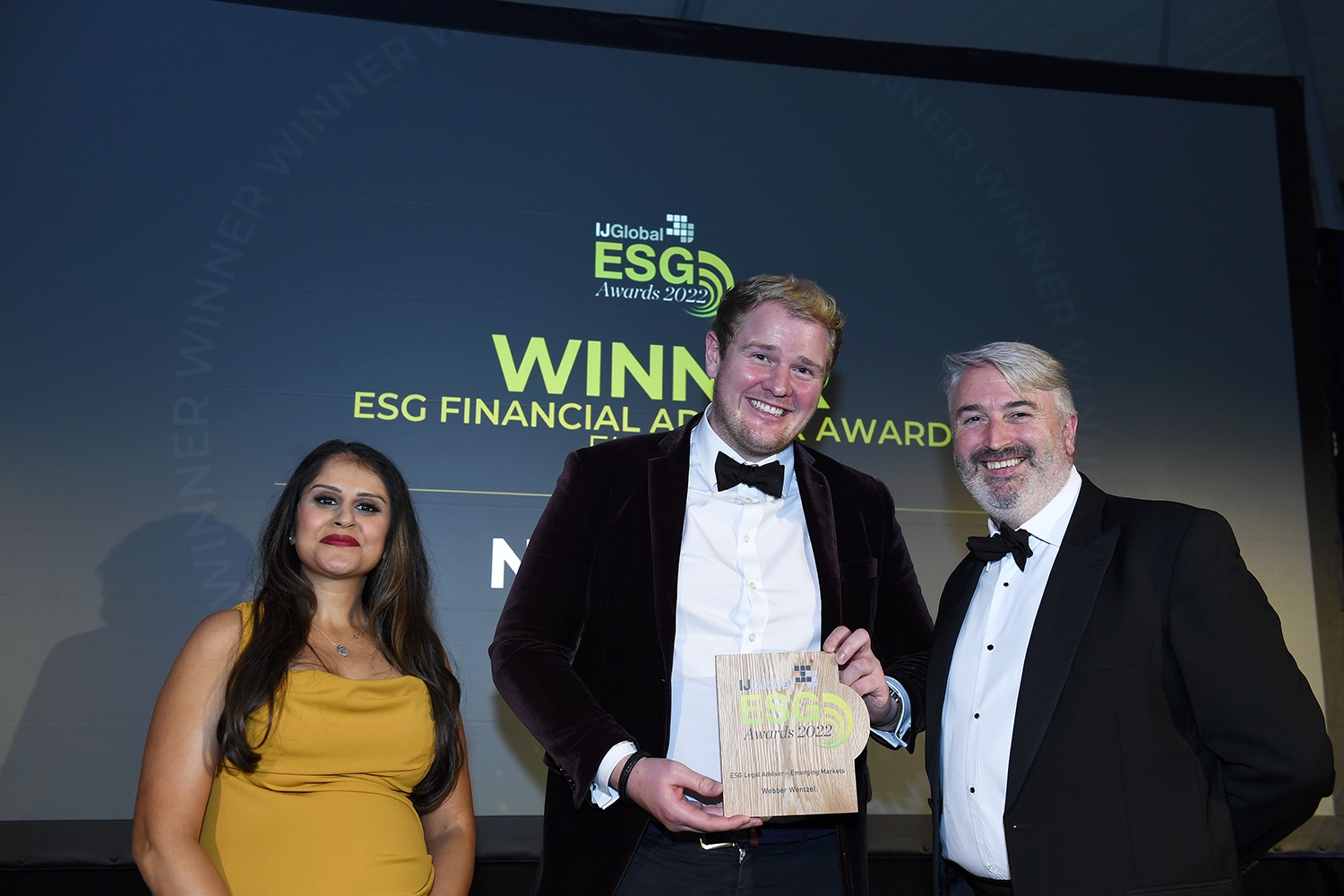IJGlobal ESG Financial Adviser – Europe – NatWest
NatWest was voted winner of the IJGlobal ESG Financial Adviser of the Year for Europe based on what judges described as “innovative transactions” and “considerable direct support for the EV/transport sector”.
One judge was particularly impressed by NatWest’s involvement in “innovative transactions such as the Gasunie sustainability linked bond” and one more adding that it “appears very set on ESG initiatives and commitments internally”.

The NatWest submission states: “We believe that this award is highly aligned with NatWest Group’s own ESG achievements and objectives, which go well beyond the provision of sustainable finance.
“We have structured our application across 3 pillars of innovation in ESG transactions and advisory; NatWest’s own ESG initiatives and commitments; and NatWest’s ESG collaborations which showcase the breadth and depth of our ESG commitment and expertise.”
NatWest has committed to fund £100 billion climate and sustainable funding by full-year 2025 and the lender has provided (at the time of writing) £19 billion of this across 86 transactions.
In Infrastructure and beyond, NatWest has developed transformative ESG financing structures, evidenced by the transactions submitted: Orsted, Zenobe and Gasunie.
Orsted
NatWest acted as financial adviser on the debt financing of around €900 million for the partial acquisition and construction of the 900MW German offshore wind farm Borkum Riffgrund 3 (BR3) with Ørsted Wind Power and Glennmont Asset Management jointly invested.
Given that BR3 was the first large-scale unsubsidised offshore wind transaction, the debt financing for this demanded innovation to achieve significant debt capacity.
It was all the more challenging as lenders are hesitant to participate in merchant projects, and the length of contract tenures restrict volumes of debt that can be raised and level of efficiency of the capital structure.
To deliver on this challenge and achieve significant debt capacity, the sponsors and NatWest – as sole financing adviser – delivered an innovative solution.
This involved both structuring innovations and a unique approach to market, which were unique to date, including fundamentally amended more traditional financing structure by introducing a “merchant tail/ tranche” with longer tenor, which delivered sufficient debt capacity to meet equity process objectives, while managing overall merchant risk for lenders.
It also involved structured financing around revenue security provided by long-term PPAs with Ørsted, offering merchant risk protection through a combination of fixed price, collar and route to market tranches.
Similarly, Ørsted secured these PPAs with their own signing of committed corporate PPAs for the renewable power – key to that being a contract with BASF with a 25-year lifespan, the longest seen for offshore wind globally.
Given the first-to-market nature of the transaction, through a selective strategy, NatWest approached a mix of experienced “unsubsidised” and relationship banks to gauge appetite for the transaction and optimised the “trade-off” between offtake strategy and leverage.
This landmark financing thus helped start a new chapter for renewable financing, creating the first large scale structure that provides significant debt capacity for large unsubsidised wind projects.
Zenobe
NatWest was financial adviser on the inaugural debt financing for Zenobe developing the first-of-its-kind Green debt platform, raising £240 million by accessing multiple financing markets to finance growth plans in the electric vehicle (EV) sector.
Historically battery projects have struggled to secure scale debt financing, due to concerns over the complexity of business models, long-term revenue potential, asset life and technology risk uncertainty.
Zenobe benefits from strong equity backing and had also raised limited amounts of secured receivables financing, with the size limitations of such products.
However, Zenobe sought to radically accelerate the expansion of the EV fleet sector, for which it required scale debt financing.
This scale of debt funding required innovation across multiple fronts by NatWest and Zenobe to deliver a unique and bespoke structure.
This included Zenobe completely transforming its financing structure from asset finance based to one based on contracted cash flow, perfectly aligned with its business model.
Zenobe and NatWest also structured the transaction to align the tenor of the longer-term funding with the duration of the contracts Zenobe has in place with the operators. This helps it raise funding against contracted cashflows from existing and future contracts with operators.
As such, Zenobe moved from an asset finance model with limited liquidity, to an “infra-like” structure which allows it to raise higher debt quanta on an ongoing basis and at relatively low cost.
Gasunie
NatWest acted as financial adviser to Gasunie on its inaugural sustainability linked bond (SLB) raising €300 million with a tenor of 15 years.
Gasunie is the first company in the European gas transmission sector to issue an SLB, which provides the ideal financing tool for gas infrastructure which is crucial to the energy systems of the Netherlands and Germany.
However due to its carbon footprint and “transition” nature, traditional investments in gas and gas infrastructure are not green enough for a green use of proceeds bond – more suited to the likes of wind and solar power.
For Gasunie a large part of the €7 billion investment plan is to use it on hydrogen infrastructure, but this is earmarked for the latter half of the decade and/or on projects yet to be finalised, which meant the use of proceeds structure was not appropriate.
However, companies in the gas business want to set comprehensive decarbonisation targets and KPIs – beyond their hydrogen investments – today, which was Gasunie’s objective.
This means that the SLB was the ideal structure for transition companies which provides companies like Gasunie with use of proceeds flexibility but incentivises them to start investing today to meet decarbonisation targets earlier.
Picture added after IJGlobal ESG Awards 2022 (left-to-right): IJGlobal editor Ila Patel; Jacob Lloyd from NatWest; IJGlobal editorial director Angus Leslie Melville.
Request a Demo
Interested in IJGlobal? Request a demo to discuss a trial with a member of our team. Talk to the team to explore the value of our asset and transaction databases, our market-leading news, league tables and much more.


